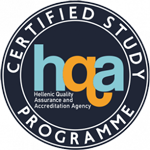Theory / Lab / Tutoring / Exercises Sessions
3 / - / - / -
Instruction & Examination Language
Greek
Available for Erasmus Students
No
Course Type
Special Background
Course Objectives - Contents
Section 1: Introduction
- Description of Financial Accounting
- Accounting Cycle
- Recognition of Events
- Execution of accounting entries
- Calendar update
- General Ledger update
- Balance
- Preparation of Financial Statements
- Closing Books
- International Accounting Standards – IFRS
- Financial Statements of the Ship-Owning Company)
Section 2: Fixed Assets – Vessels
- Ship Acquisition Cost
- Purchase of a New Ship
- Buy a Used Ship
- Ship Accounting Tracking after the Purchase
- Subsequent Expenses (Additions – Improvements)
- Depreciation
- Changes in Value
- Special Survey & Drydocking Expenses
Section 3: Leasing
- Accounting monitoring of Long-Term Asset Leases (Leasing)
Section 4: Income
- Hire Income
- Freight Income
- Capitalization of Ballast Costs
Section 5: Direct Voyage Expenses
- Bunker Expenses
- Address and Brokerage Commissions)
- Port Expenses – Canal Tolls – Cargo Expenses – Other
- Cash Advances to Agents
Section 6: Operating Expenses
- Crew Costs
- Insurances
- Repairs – Maintenance
- Spares
- Stores
- Lubricants
Section 7: Inventories
- Determination of Ending Stock Value
- Determining Cost of Inventory Consumption
- Determining the current value of inventories
- Inventory accounting at the lowest price
Section 8: MGA
- Update MGA
- Accounting of MGA balances
Section 9: Loans
- Understanding Loan Agreements
- Registration of loan receipt
- Registration of Interest Expenses
- Loan Monitoring
- Monitoring and Compliance with Loan Covenants
Unit 10: Financial Instruments
- Accounting monitoring of financial products
- Forward Contracts,
- Future Contracts,
- Options,
- Swaps
- Shares
- Bonds
Section 11: Participation in Businesses
- Participation in Associated Businesses (Associates)
- Participation Subsidiaries
Section 12: Consolidation
- Consolidation conditions
- Preparation of Consolidated Financial Statements
- Elimination of Capital - Investments
- Elimination of intra-company claims - liabilities
- Elimination of intra-company transactions
Section 13: Intercompany Accounts
- Intercompany Accounts mode of operation
Learning Results
The course focuses on the accounting handling of issues and occurrences specific to ship-owning companies in the maritime shipping industry, commonly referred to as maritime accounting. The course adheres to the guidelines set forth by the International Accounting Standards. The primary objective of this program is to familiarize participants with the intricacies of shipping accounting and provide them with the necessary skills to effectively address and record the common challenges faced by shipping companies in real-world scenarios.
The course encompasses the subjects that are relevant to the everyday responsibilities of accounting personnel within a ship-owning corporation, ranging from entry-level employees to supervisors.
Upon the successful culmination of the course, students will acquire the capacity to comprehend:
- International Accounting Standards pertaining to shipping-related activities
- Fundamental principles of maritime concepts
- Accounting transactions in accordance with International Accounting Standards
- Phases and protocols for maintaining accounting records
- Contemporary developments in the field of Maritime Accounting




